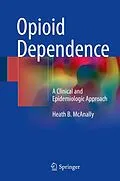This unique and timely title offers a comprehensive assessment of the previously underappreciated risks and potentially overstated benefits of chronic opioid therapy. It does so by approaching the rampant problem of opioid abuse and addiction - currently labeled an epidemic in the United States -- from a public health/epidemiologic perspective. That is, following a thorough overview in Part 1 that compares (and contrasts) classic infectious disease epidemiology concepts with the epidemic, the book categorizes our current understanding of basic science and best clinical practices in opioid therapy in terms of Agent (opioid), Vector (prescriber) and Host (patient) factors. The majority of the book, which includes a plethora of instructional case studies, is organized according to these three arenas. Opioid Dependence: A Clinical and Epidemiologic Approach is designed to update all clinicians on opioid basic science, current areas of drug improvement research and development, alternatives to opioid therapy, evidence-based indications for opioid therapy, and clinical strategies for preventing and overcoming opioid dependence. Importantly, an overview of clinical practice guidelines from the American Society of Addiction Medicine, with its biopsychosocial-spiritual "multidimensional assessment" focus is provided, along with a discussion of medication-assisted treatment, organized by the three currently FDA-approved pharmacotherapeutics (methadone, buprenorphine and naltrexone). Developed for practitioners at every level, this ground-breaking title offers a fresh and novel approach to improving the care and outcomes of patients receiving opioid therapy.
Autorentext
Heath McAnally, MD, MSPH
Medical Director
Northern Anesthesia & Pain Medicine, LLC
Eagle River, AK, USA
Clinical Instructor
University of Washington School of Medicine
WWAMI Program
Anchorage, AK, USA
Zusammenfassung
Inhalt
An Epidemiologic Perspective.- Understanding the Agent, Part I: Opioid Biology and Basic Pharmacology.- Understanding the Agent, Part II: Adverse Effects.- Understanding the Agent, Part III: Specific Drugs.- Attenuating the Agent: Reducing Opioid Virulence.- Best Practices Education, Part I: Pain Physiology, Psychology, and Alternatives to Opioids .- Best Practices Education, Part II : Evidence for and against Opioid Therapy.- Best Practices Education, Part III: Regulatory and Advisory Issues Related to Opioid Therapy for Pain.- Addressing Host Factors: Overview of Dependence and Addiction.- Opioid Dependence Risk Factors and Risk Assessment.- Addressing Host Factors: Primary, Secondary and Tertiary Prevention of Opioid Dependence.- Conclusion.
